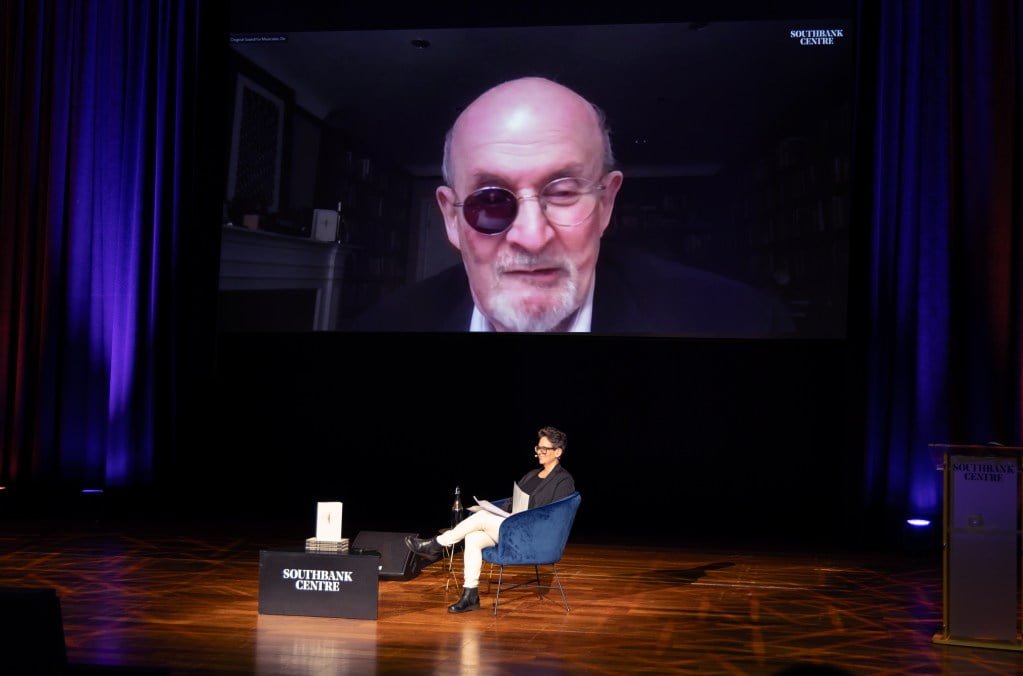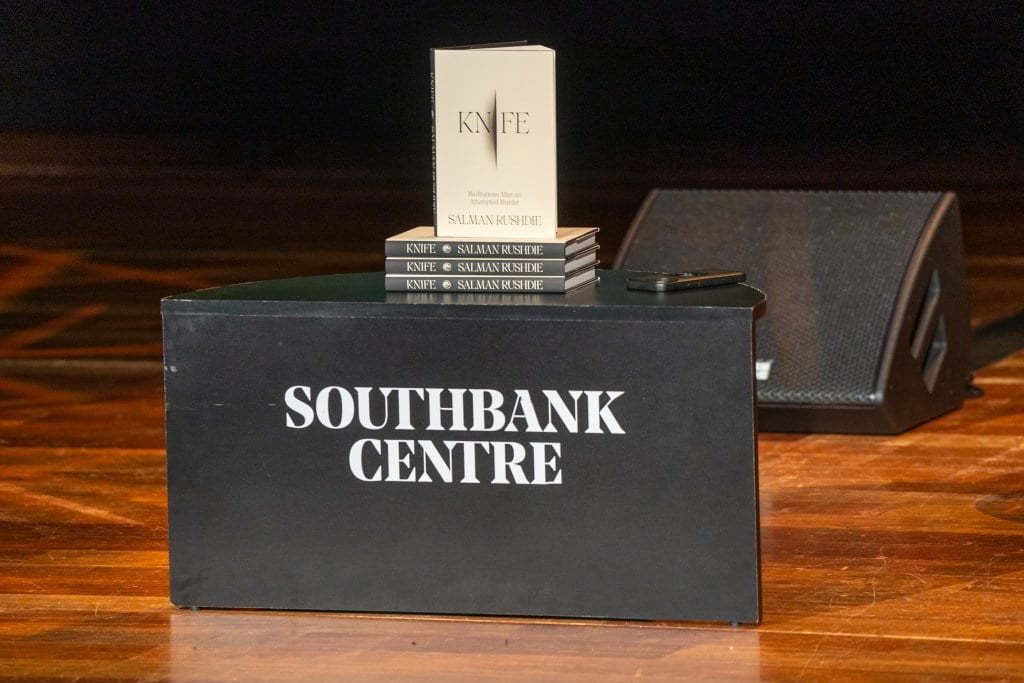
“The power that literature has is the power to describe events in a way that the books then owns those events,” Salman Rushdie told a rapt audience. In an evocative evening at the Queen Elizabeth Hall in London, the renowned author spoke candidly for the first time about the harrowing incident on August 12, 2022, that nearly took his life. The event, which included live readings from actors Anjana Vasan and Sanjeev Bhaskar, was a reflection and an exploration of personal endurance and the solace found in storytelling. The event is part of the Southbank Centre’s Literature and Spoken Word Spring Season, which runs from March to June 2024.
The Booker Prize-winning author participated via video livestream from New York where he resides, sharing insights into his latest book, “Knife,” which delves deeply into his survival after a brutal attack thirty years post the infamous fatwa against him. His story is not just a recount of the physical scars but an intimate look at the psychological resilience following the attack.
“Well, I mean, I think I’ve surprised myself by how well I am,” Rushdie remarked, reflecting on his recovery, which he described as miraculous to some extent, considering the scepticism of his medical team. Despite the trauma and the physical injuries received including losing his eye, his spirit appeared unshaken, and his intellectual verve was as sharp as ever.
Intersection of reality and fiction in his life and work
Rushdie’s conversation with seasoned literary editor and writer Erica Wagner included the motivations behind his memoir. He revealed that initially, he was reluctant to write about the assault. However, encouraged by his agent, he realised the importance of facing the ordeal through his writing, “It would be ludicrous to write some kind of fictional text about something completely different.”
The discussion took a distressing turn as the author of “Shame” described the attack itself, which lasted a terrifying 27 seconds and involved an assailant referred to only as ‘A.’ “I was aware of a lot of blood…and I was aware of it coming out of me,” he shared, showcasing the dissonance between his internal shock and external reactions.
“I always thought that that was a good way to approach things and that somehow you could even get closer to the truth about human nature, by abandoning realism. And also I thought the world has abandoned realism.”
Salman Rushdie
Rushdie also extended gratitude towards those who intervened during the attack, including conference moderator Henry Reese and members of the audience, whose quick actions he credits with saving his life. Reese was injured in the attack, sustaining a knife wound and a badly bruised right eye while holding down the legs of the attacker who leapt on stage at the Chautauqua Institution.
Discussing his novel “Shalimar the Clown,” which is now 20 years old, Wagner spoke about being haunted by “a single image that I couldn’t get out of my mind. The image of a dead man lying on the ground while a second man, his assassin, stood over him holding a bloodied knife.” This prophetic image holds new weight for Rushdie, considering his own near-fatal experience.
Read the review: Knife by Salman Rushdie: a memoir about mortality
“Well, it’s a kind of magic realist idea, you know. But the fact is that, you know, I’m quite down to earth in my worldview. I don’t believe in miracles and things like that, but somehow my books always have,” Rushdie explained. He elaborated on the influence of the fantastical tales he grew up with in India, suggesting that such stories allow a closer approach to the truth about human nature by abandoning realism.
Rushdie also commented on the current global political climate, remarking, “We don’t live in realism. We live in surrealism. You know, we live in a world in which Boris Johnson can be prime minister of the kingdom…and Donald Trump, President of the United States.” He argued that in such a world, realism seems more like a fairy tale, and his style of writing, rooted in a blend of fact and fiction, mirrors the inherent craziness of reality.
Reflecting on his survival from the attack, Rushdie attributed it not to divine intervention but to a series of fortunate events and medical expertise. “Amazingly, there was a slash right across my neck, but he didn’t cut the artery. Three stab wounds in my torso, but he didn’t hit the heart,” he said. The combination of luck and surgical skill played a critical role in his survival, exemplifying his belief in what he describes as medical miracles and the role of chance in human life.
The role of optimism in his life, literature, and recovery
The evening touched on lighter notes as well, reflecting Rushdie’s well-known wit and his ability to find humour in even the most dire circumstances. Wagner pointed out how Rushdie’s enduring optimism has been a consistent theme throughout his career, where he describes it as both his “great weakness and great strength.”
Reflecting on his storied life, Rushdie shared insights into how this outlook has influenced his writing and personal resilience, especially in the face of adversity. “Yeah. I mean, way back when I was writing ‘Midnight’s Children,’ there’s a passage there in which optimism is referred to as a disease, that people can be infected by it. And sometimes you get infected by it for life. And I think that’s what happened to me,” Rushdie explained.

Rushdie discussed the character of Quichotte, a figure in one of his more recent novels, describing him as a “Candide-like figure” who embodies an almost hyperbolic level of optimism. “I remember that the subtitle of Voltaire’s Candide is optimism. It’s called Candide or optimism. And so I created this character who’s, in a way, a satire of myself, who was just ludicrously, pathetically optimistic in the face of all the evidence,” he added.
“I think one of the things that got me through the bad years after the attack on ‘The Satanic Verses’ began was my conviction that I would find a way out of it. That wouldn’t be it for me. There would be more. I think it may have had something to do with my recovery from this attack.”
Salman Rushdie
Read: Salman Rushdie Knife memoir: attack trial delayed due to book
The author also touched on the role this mindset played in helping him navigate through the most challenging periods of his life. “I think one of the things that got me through the bad years after the attack on ‘The Satanic Verses‘ was my conviction that I would find a way out of it. That wouldn’t be it for me. There would be more,” Rushdie remarked, underlining his belief in the power of a positive outlook to overcome dire circumstances.
Rushdie’s determination was particularly evident in his recovery process from the recent attack, where his inherent optimism played a crucial role. “I was absolutely determined that I would regain my life, and have taken steps to do so,” he affirmed.
Read: Hanif Kureishi’s Dispatches: an ode to writers like Salman Rushdie in recovery
Beyond recalling the attack, Rushdie ventured into the themes of his book, which he described as a tribute to love and resilience, exemplified by his relationship with his partner, Eliza. “This is about, in a way, about the love story regaining the podium,” he stated, focusing on the transformative power of love over life’s darkest moments.
Rushdie’s philosophical and often reflective insights explored the nature of storytelling, personal and communal histories, and the role of the writer in shaping narratives against the odds. As the evening drew to a close, the audience was left with a deep appreciation for Rushdie’s commitment to freedom of speech, his indomitable spirit, and his unassailable belief in the power of words to overcome adversity.
Hero image credit: © Ed Lederman/PEN American Center
You can watch Salman Rushdie live for free here between April 21st and Apr 28th from 2.30pm. He will share his survival story and talk about his new book “Knife” via the Southbank Centre’s livestream page.
[…] Read: Salman Rushdie discusses survival, optimism, and resilience at Southbank event […]